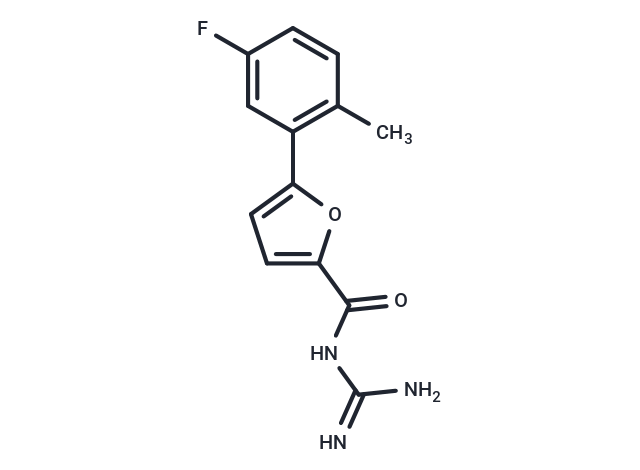Shopping Cart
Remove All Your shopping cart is currently empty
Your shopping cart is currently empty
KR-32568 is a sodium/hydrogen exchanger 1 (NHE-1) inhibitor (IC50: 230 nM) with potent cardioprotective effects. At a concentration of 10 μM, it restored cardiac systolic function in an isolated ischemic rat heart model. Additionally, KR-32568 (0.3 mg/kg) reduced myocardial infarction size in a rat model of ischemia and reperfusion injury.

| Pack Size | Price | USA Warehouse | Global Warehouse | Quantity |
|---|---|---|---|---|
| 5 mg | $35 | In Stock | In Stock | |
| 10 mg | $53 | In Stock | In Stock | |
| 25 mg | $108 | In Stock | In Stock | |
| 50 mg | $163 | In Stock | In Stock | |
| 100 mg | $247 | In Stock | In Stock | |
| 1 mL x 10 mM (in DMSO) | $40 | In Stock | In Stock |
| Description | KR-32568 is a sodium/hydrogen exchanger 1 (NHE-1) inhibitor (IC50: 230 nM) with potent cardioprotective effects. At a concentration of 10 μM, it restored cardiac systolic function in an isolated ischemic rat heart model. Additionally, KR-32568 (0.3 mg/kg) reduced myocardial infarction size in a rat model of ischemia and reperfusion injury. |
| Targets&IC50 | NHE1:230 nM |
| In vitro | KR-32568 (10 nM-1 μM) inhibited NHE-1-mediated platelet swelling induced by intracellular acidification in rabbit platelet-rich plasma in a concentration-dependent manner, with an IC50 value of 24 nM.[1] |
| In vivo | KR-32568 (0.1-1.0 mg/kg; i.v.; once) exerts effective cardioprotective effects in rats, such as reducing infarct size and significantly reducing the total number of premature ventricular contractions.[1] |
| Molecular Weight | 261.25 |
| Formula | C13H12FN3O2 |
| Cas No. | 852146-73-7 |
| Smiles | CC1=C(C=2OC(C(NC(=N)N)=O)=CC2)C=C(F)C=C1 |
| Storage | Powder: -20°C for 3 years | In solvent: -80°C for 1 year | Shipping with blue ice/Shipping at ambient temperature. | |||||||||||||||||||||||||||||||||||
| Solubility Information | DMSO: 90 mg/mL (344.5 mM), Sonication is recommended. | |||||||||||||||||||||||||||||||||||
| In Vivo Formulation | 10% DMSO+40% PEG300+5% Tween 80+45% Saline: 3.3 mg/mL (12.63 mM), Sonication is recommended. Please add the solvents sequentially, clarifying the solution as much as possible before adding the next one. Dissolve by heating and/or sonication if necessary. Working solution is recommended to be prepared and used immediately. The formulation provided above is for reference purposes only. In vivo formulations may vary and should be modified based on specific experimental conditions. | |||||||||||||||||||||||||||||||||||
Solution Preparation Table | ||||||||||||||||||||||||||||||||||||
DMSO
| ||||||||||||||||||||||||||||||||||||
| Size | Quantity | Unit Price | Amount | Operation |
|---|

Copyright © 2015-2026 TargetMol Chemicals Inc. All Rights Reserved.